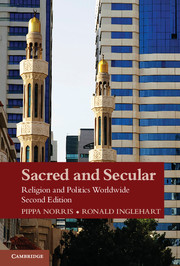Book contents
- Frontmatter
- Contents
- Tables
- Figures
- Preface and Acknowledgments
- Part I Understanding Secularization
- Part II Case Studies of Religion and Politics
- Part III The Consequences of Secularization
- Conclusions
- 10 Secularization and Its Consequences
- 11 Reexamining the Theory of Existential Security
- 12 Reexamining Evidence for the Security Thesis
- Appendix A
- Appendix B
- Appendix C
- Notes
- Bibliography
- Index
11 - Reexamining the Theory of Existential Security
from Conclusions
Published online by Cambridge University Press: 05 June 2012
- Frontmatter
- Contents
- Tables
- Figures
- Preface and Acknowledgments
- Part I Understanding Secularization
- Part II Case Studies of Religion and Politics
- Part III The Consequences of Secularization
- Conclusions
- 10 Secularization and Its Consequences
- 11 Reexamining the Theory of Existential Security
- 12 Reexamining Evidence for the Security Thesis
- Appendix A
- Appendix B
- Appendix C
- Notes
- Bibliography
- Index
Summary
in recent years, religion has become increasingly prominent around the world. The persistence of high rates of churchgoing in the United States, the growing importance of liberation theology in Latin America, and religious conflict in the Balkans, demonstrated that religion had not faded as a potent force in many contemporary societies. That point was reinforced by the events of 9/11 in the United States; ethnic and religious tensions in Europe; and repeated outbursts of violent conflict among religious groups in Nigeria, Sudan, and India.
One widespread assumption is that these disparate events reflect a worldwide revival of religion. Rodney Stark and Roger Finke argue forcefully that the traditional secularization thesis has been discredited, and they are far from alone in holding this view. We believe that the picture is more complex. This book has presented a theory of existential security, backed by empirical evidence from scores of societies, demonstrating growing religious divergence worldwide. On one hand, religious values and practices remain strong in developing societies, which have rapidly growing populations; and religion is making a comeback in many ex-Communist countries, filling the vacuum left by the collapse of communism. But at the same time, secularization has been occurring in most advanced industrial societies. This erosion of church attendance, religious values, and beliefs has been most clearly observed in Scandinavia and Western Europe, which has led some scholars to claim that Western Europe is the exception – not the United States. The depth of change does vary across societies, but the decline of religious values and practices is not confined to Western Europe. Similar developments are evident in comparable affluent postindustrial societies such as Australia, New Zealand, Japan, and Canada; even in the United States, a trend toward secularization is discernable, though partly masked by the large-scale immigration of people with traditional worldviews.
- Type
- Chapter
- Information
- Sacred and SecularReligion and Politics Worldwide, pp. 243 - 252Publisher: Cambridge University PressPrint publication year: 2011



